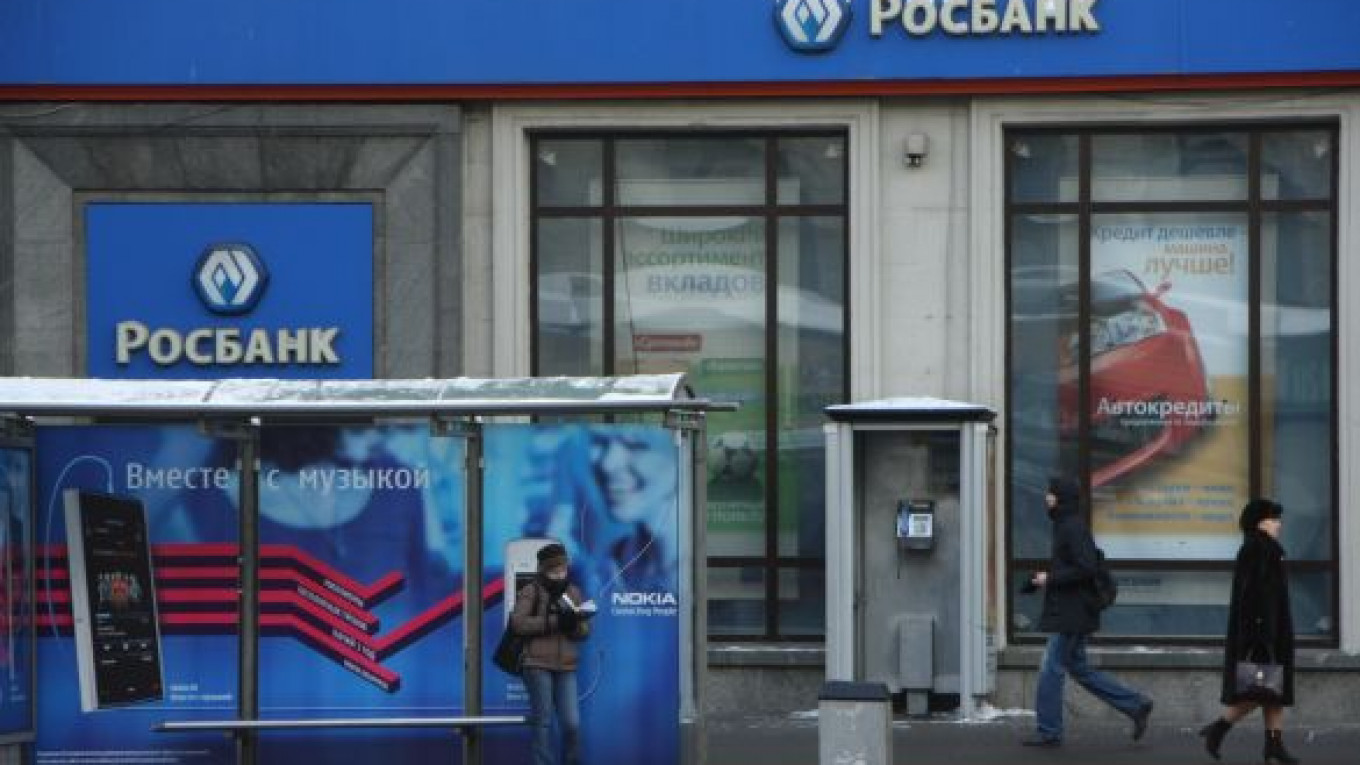The Central Bank is worried about the scale of borrowing by European banks from their Russian subsidiaries and may regulate outflows to support domestic liquidity and reduce the risk of financial shocks.
The regulator said at the end of last week that units of Italian, French and Austrian banks have ramped up their net foreign asset positions, helping fund their parent banks as they face possible write-offs on sovereign debts of troubled euro-zone members led by Greece.
"There is an expert opinion that this practice is not good for the market and requires some kind of regulation," said Alexander Vinogradov, an official from the Central Bank's supervision department.
The net foreign asset position of Russia's banking sector rose $12 billion in October to $53 billion — a reversal from its net liability position before the global financial crisis struck in late 2008.
Then, the Central Bank sold $200 billion — a third of its reserves — in a bid to stave off a collapse in the ruble, in so doing helping banks meet their foreign debt obligations.
Now, regulators are concerned that lending by local banks to their struggling foreign parents may deal a shock to the Russian banking system at a time when funding is already scarce.
The regulator said earlier this month that it would double the amount of money available through repurchase agreements to 2 trillion rubles ($63.44 billion) to ease funding strains.
One senior Western banker said Central Bank Chairman Sergei Ignatyev had been holding one-on-one meetings with bank chief executives, and warned that if they boosted their foreign assets too far their access to repo funding could be restricted.
This, the banker said, amounted to moral suasion aimed at minimizing contagion risks that might result were Europe to be hit by a full-blown banking crisis.
Vinogradov said the Central Bank did not have the formal power to restrict access to repo funding, but noted that it did cut limits on emergency, collateral-free loans to banks that lent too freely to their parents in the last financial crisis.
Among the 10 banks with the largest external net asset exposure, seven are subsidiaries of foreign banks, Vinogradov told a hearing of the banking committee of the Russian Union of Industrialists and Entrepreneurs, a business lobby group.
"The problem is not that they are using our liquidity to save their parent banks; it is that they are exporting capital and drying out the [local] market, where capital is needed," he said.
Analysts note that the local unit of Italy's UniCredit ramped up lending to its parent to 173 billion rubles ($5.5 billion) at the end of September from 8 billion rubles last year, according to its international financial statements.
"If at the start of the year this represented 1.5 percent of its assets, it was 23 percent at the end of the third quarter," said Yulia Safarbakova at Trust Bank in Moscow.
Parent bank UniCredit has reported a third-quarter loss of 10.6 billion euros ($14.15 billion) and announced plans to raise 7.5 billion euros in new capital to shore up its balance sheet.
November bank results, to Russian accounting standards, show that Rosbank, a unit of France's Societe Generale, and the local unit of Austria's Raiffeisen Bank International have also boosted funding to their parent entities.
The head of Raiffeisen's Russian unit, Sergei Monin, said Wednesday that the bank had a strong financial position, with its loan book fully covered by client deposits.
"We are growing now, in line with the market, and plan to maintain our position in Russia," Monin said, in comments supported by Raiffeisen International board member Patrick Butler. "We are very committed here," he said.
Volksbanken, which failed a European bank stress test and abandoned plans to repay state aid this year, said in a statement Friday that it expects a 2011 loss of at least 825 million euros ($1.1 billion). Write-downs in Romania and Hungary plunged it into a third-quarter net loss of 696 million euros from a 24.9 million euro profit a year earlier.
“Due to the continued volatile market environment and the poor economic conditions in some countries, the annual result is expected to decrease even further,” the company said in the statement.
Volksbanken is restructuring after announcing an expected annual loss on Oct. 13 of as much as 750 million euros.
Volksbanken’s core capital ratio will rise to 10.4 percent at the end of the year, from 9.5 percent in September, once the sale of the business outside of Romania is closed, the company said. Sberbank is seeking to lower the price for the business, which comprises nine banks in eight countries, to about 500 million euros, two people familiar with the situation said this week.
A Message from The Moscow Times:
Dear readers,
We are facing unprecedented challenges. Russia's Prosecutor General's Office has designated The Moscow Times as an "undesirable" organization, criminalizing our work and putting our staff at risk of prosecution. This follows our earlier unjust labeling as a "foreign agent."
These actions are direct attempts to silence independent journalism in Russia. The authorities claim our work "discredits the decisions of the Russian leadership." We see things differently: we strive to provide accurate, unbiased reporting on Russia.
We, the journalists of The Moscow Times, refuse to be silenced. But to continue our work, we need your help.
Your support, no matter how small, makes a world of difference. If you can, please support us monthly starting from just $2. It's quick to set up, and every contribution makes a significant impact.
By supporting The Moscow Times, you're defending open, independent journalism in the face of repression. Thank you for standing with us.
Remind me later.






